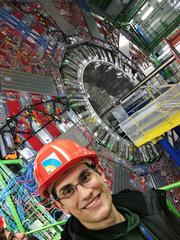Andrea Malara, Doktorand an der Universität Hamburg
Name: Andrea Malara
Status: Doktorand
Institut: Universität Hamburg
- I decided to study particle physics because… during my high school studies, I was struck by the infinity hidden behind even the smallest particles; this curiosity was once again reinforced at university.
- Currently I am working on… performing a search for new particles that decay to the Higgs boson using novel techniques which employ Machine Learning. I am also involved in the calibration of the jet energy resolution, used later on by the entire CMS Collaboration.
- This is important because… expanding the knowledge of our understanding of the universe can be achieved with multiple approaches: probing unexplored areas in the search for new phenomena or measuring with increasingly high precision properties of the Standard Model looking for hints of new physics.
- A typical working day means… talking with people! Despite the most common perspective of a scientist spending the whole time isolating himself behind a computer or a machine, we are actually rather social. We confront ourselves with our colleagues; we discuss with students; we have internal and international daily meetings; we chat about physics even during coffee breaks. You never know where and when the inspiration could appear. There also comes a time when we code and make plots and study, which is also fascinating per se since the same problem never occurs twice. It’s always stimulating!
- I work together with… Only few co-workers (Professors, researchers, students) of mine are effectively in my office or in the one nearby; many of them are spread around the world and thanks to the vast network we have, it’s possible to work closely with them, too. This world-wide team is one of the aspects of being a physicist I like the most.
- Being a member of the CMS Collaboration means for me… being part of a wide project. Every day is challenging and intriguing at the same time. Sharing and comparing are the key words to describe the way we live this adventure, work-wise but also culturally speaking with different perspectives and habits. Internationality and ideas exchange are the beating heart of every research.
- The next book that I want to read is… "Six easy pieces". The idea of Richard Feynman (the author) is to give an extremely simplified overview of the relation between physics and the more general natural science, together with a simple excursus about basic physics. The purpose of science is to increase the general knowledge of an increasingly high number of people and not only of few experts. This is my next challenge, and I want to read how other scientists did that before me. In the end, you can say to have really understood something if you can explain it with simple words to a non-specialist.
- Particle physicists are… compulsive picture analysers. We build and use detectors (CMS in my case) which take pictures of particle collisions occurring 40 million times per second. What we hope CMS will tell us is whether there is any new particle or new phenomena in the universe that we don’t know yet of.

